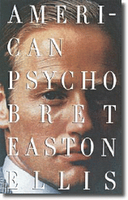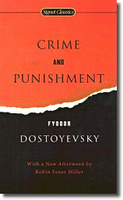
The line came to mind when reading Scottish writer Nick Brooks' top ten literary murderers list in the Guardian.
Literary killers hold a deep fascination for us, taking grip of the imagination when other forms of writerly voyeurism have long since faded. During the writing of my own novel, The Good Death, a number of the works on this list occupied my thoughts, and I could easily have included many more novels and stories, settling instead for the ones that have been most influential on a personal level, the ones that stick with me still, many years after my first bruising encounters with them. It is no exaggeration to say that the characters who inhabit these works seem to exert an undue--possibly malign--power upon the psyche of the reader who stumbles, hapless, upon them.A couple of his choice killers:

Click here to read Brooks' other eight picks.Patrick Bateman, American Psycho, Bret Easton Ellis
Bastard offspring of Thatcher and Reagan, Patrick Bateman kills with the same care and attention he might pay to his early morning shaving routine, gym workout or his collection of Huey Lewis and The News albums. Vilified on publication, American Psycho set a new benchmark for horror and humour.
Raskolnikov, Crime and Punishment, Fyodor Dostoyevsky
Starving and feverish in his yellowing St Petersburg room, Raskolnikov murders a moneylender and her daughter to set himself apart from the venal masses and make himself a superman. Then he begins to have his doubts. Perhaps one of the greatest novels ever written, and certainly one of the most influential.
Nick Brooks' The Good Death, says the Guardian, "is a murder mystery with a difference. Less whodunit than who-am-I, the murderer is pursued more keenly by his conscience than by the police." It is not yet available in the U.S. but hopefully that will soon change.
--Marshal Zeringue






